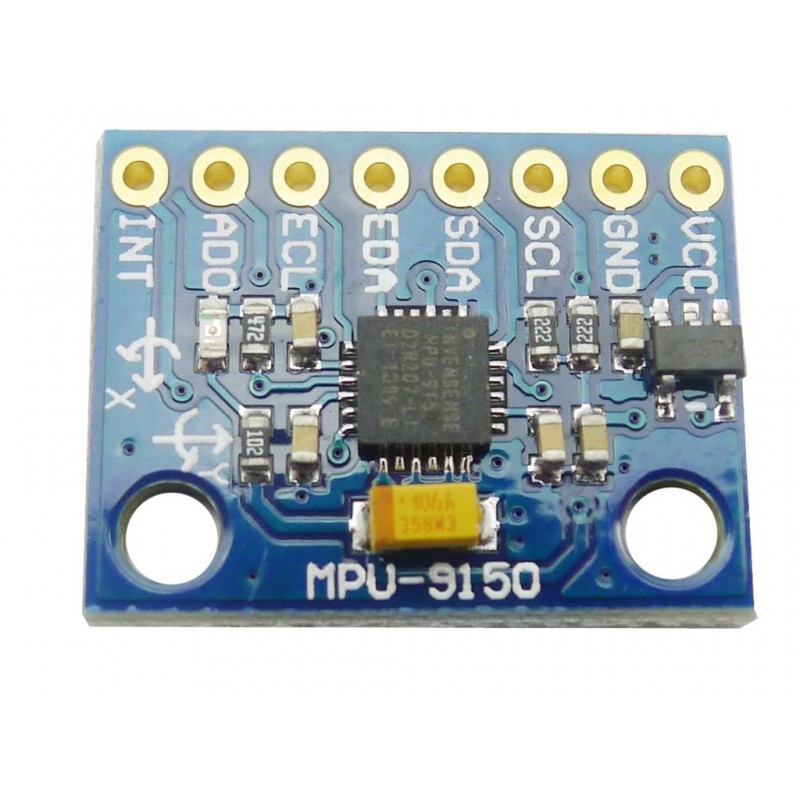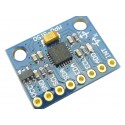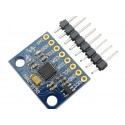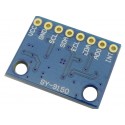Mpu9150 9 Axis Attitude Gyro Accelerator Magnetometer Sensor Module
Rs. 133.00 Rs. 153.00
- Brand: https://invensense.tdk.com/products/motion-tracking/9-axis/mpu-9
- Product Code: SEN-DOF
- Availability: In Stock
- Price in reward points: 18
- For Bulk Order
 9962060070
9962060070
| SPECIFICATION | |
| Chip | MPU-9250 |
| Power supply | 3-5v (internal low dropout regulator) |
| Communication | Standard IIC / SPI communication protocol |
| 16bit AD converter-chip 16-bit data output | |
| Gyro range | ± 250 500 1000 2000 ° / s |
| Acceleration range | ± 2 ± 4 ± 8 ± 16g |
| Magnetic field range | ± 4800uT |
| Using Immersion Gold PCB, machine welding process to ensure quality | |
| 2.54mm pin spacing | |
| Module size 15mm * 25mm |
| Chip | MPU-9250 |
| Power supply | 3-5v (internal low dropout regulator) |
| Communication | Standard IIC / SPI communication protocol |
| 16bit AD converter-chip 16-bit data output | |
| Gyro range | ± 250 500 1000 2000 ° / s |
| Acceleration range | ± 2 ± 4 ± 8 ± 16g |
| Magnetic field range | ± 4800uT |
| Using Immersion Gold PCB, machine welding process to ensure quality | |
| 2.54mm pin spacing | |
| Module size 15mm * 25mm |
PACKAGE INCLUDES:
1 PCS x Mpu9150 9 Axis Attitude Accelerator Gyro Magnetometer Sensor Module
https://invensense.tdk.com/products/motion-tracking/9-axis/mpu-9150/
//SOURCE CODE TAKEN FROMBELOW LINK
//https://playground.arduino.cc/Main/MPU-9150/
//MPU-9150 Accelerometer + Gyro + Compass + Temperature
// -----------------------------
//
// By arduino.cc user "frtrobotik" (Tobias Hübner)
//
//
// July 2013
// first version
//
// Open Source / Public Domain
//
// Using Arduino 1.0.1
// It will not work with an older version,
// since Wire.endTransmission() uses a parameter
// to hold or release the I2C bus.
//
// Documentation:
// - The InvenSense documents:
// - "MPU-9150 Product Specification Revision 4.0",
// PS-MPU-9150A.pdf
// - "MPU-9150 Register Map and Descriptions Revision 4.0",
// RM-MPU-9150A-00.pdf
// - "MPU-9150 9-Axis Evaluation Board User Guide"
// AN-MPU-9150EVB-00.pdf
//
// The accuracy is 16-bits.
//
// Some parts are copied by the MPU-6050 Playground page.
// playground.arduino.cc/Main/MPU-6050
// There are more Registervalues. Here are only the most
// nessecary ones to get started with this sensor.
#include <Wire.h>
// Register names according to the datasheet.
// According to the InvenSense document
// "MPU-9150 Register Map and Descriptions Revision 4.0",
#define MPU9150_SELF_TEST_X 0x0D // R/W
#define MPU9150_SELF_TEST_Y 0x0E // R/W
#define MPU9150_SELF_TEST_X 0x0F // R/W
#define MPU9150_SELF_TEST_A 0x10 // R/W
#define MPU9150_SMPLRT_DIV 0x19 // R/W
#define MPU9150_CONFIG 0x1A // R/W
#define MPU9150_GYRO_CONFIG 0x1B // R/W
#define MPU9150_ACCEL_CONFIG 0x1C // R/W
#define MPU9150_FF_THR 0x1D // R/W
#define MPU9150_FF_DUR 0x1E // R/W
#define MPU9150_MOT_THR 0x1F // R/W
#define MPU9150_MOT_DUR 0x20 // R/W
#define MPU9150_ZRMOT_THR 0x21 // R/W
#define MPU9150_ZRMOT_DUR 0x22 // R/W
#define MPU9150_FIFO_EN 0x23 // R/W
#define MPU9150_I2C_MST_CTRL 0x24 // R/W
#define MPU9150_I2C_SLV0_ADDR 0x25 // R/W
#define MPU9150_I2C_SLV0_REG 0x26 // R/W
#define MPU9150_I2C_SLV0_CTRL 0x27 // R/W
#define MPU9150_I2C_SLV1_ADDR 0x28 // R/W
#define MPU9150_I2C_SLV1_REG 0x29 // R/W
#define MPU9150_I2C_SLV1_CTRL 0x2A // R/W
#define MPU9150_I2C_SLV2_ADDR 0x2B // R/W
#define MPU9150_I2C_SLV2_REG 0x2C // R/W
#define MPU9150_I2C_SLV2_CTRL 0x2D // R/W
#define MPU9150_I2C_SLV3_ADDR 0x2E // R/W
#define MPU9150_I2C_SLV3_REG 0x2F // R/W
#define MPU9150_I2C_SLV3_CTRL 0x30 // R/W
#define MPU9150_I2C_SLV4_ADDR 0x31 // R/W
#define MPU9150_I2C_SLV4_REG 0x32 // R/W
#define MPU9150_I2C_SLV4_DO 0x33 // R/W
#define MPU9150_I2C_SLV4_CTRL 0x34 // R/W
#define MPU9150_I2C_SLV4_DI 0x35 // R
#define MPU9150_I2C_MST_STATUS 0x36 // R
#define MPU9150_INT_PIN_CFG 0x37 // R/W
#define MPU9150_INT_ENABLE 0x38 // R/W
#define MPU9150_INT_STATUS 0x3A // R
#define MPU9150_ACCEL_XOUT_H 0x3B // R
#define MPU9150_ACCEL_XOUT_L 0x3C // R
#define MPU9150_ACCEL_YOUT_H 0x3D // R
#define MPU9150_ACCEL_YOUT_L 0x3E // R
#define MPU9150_ACCEL_ZOUT_H 0x3F // R
#define MPU9150_ACCEL_ZOUT_L 0x40 // R
#define MPU9150_TEMP_OUT_H 0x41 // R
#define MPU9150_TEMP_OUT_L 0x42 // R
#define MPU9150_GYRO_XOUT_H 0x43 // R
#define MPU9150_GYRO_XOUT_L 0x44 // R
#define MPU9150_GYRO_YOUT_H 0x45 // R
#define MPU9150_GYRO_YOUT_L 0x46 // R
#define MPU9150_GYRO_ZOUT_H 0x47 // R
#define MPU9150_GYRO_ZOUT_L 0x48 // R
#define MPU9150_EXT_SENS_DATA_00 0x49 // R
#define MPU9150_EXT_SENS_DATA_01 0x4A // R
#define MPU9150_EXT_SENS_DATA_02 0x4B // R
#define MPU9150_EXT_SENS_DATA_03 0x4C // R
#define MPU9150_EXT_SENS_DATA_04 0x4D // R
#define MPU9150_EXT_SENS_DATA_05 0x4E // R
#define MPU9150_EXT_SENS_DATA_06 0x4F // R
#define MPU9150_EXT_SENS_DATA_07 0x50 // R
#define MPU9150_EXT_SENS_DATA_08 0x51 // R
#define MPU9150_EXT_SENS_DATA_09 0x52 // R
#define MPU9150_EXT_SENS_DATA_10 0x53 // R
#define MPU9150_EXT_SENS_DATA_11 0x54 // R
#define MPU9150_EXT_SENS_DATA_12 0x55 // R
#define MPU9150_EXT_SENS_DATA_13 0x56 // R
#define MPU9150_EXT_SENS_DATA_14 0x57 // R
#define MPU9150_EXT_SENS_DATA_15 0x58 // R
#define MPU9150_EXT_SENS_DATA_16 0x59 // R
#define MPU9150_EXT_SENS_DATA_17 0x5A // R
#define MPU9150_EXT_SENS_DATA_18 0x5B // R
#define MPU9150_EXT_SENS_DATA_19 0x5C // R
#define MPU9150_EXT_SENS_DATA_20 0x5D // R
#define MPU9150_EXT_SENS_DATA_21 0x5E // R
#define MPU9150_EXT_SENS_DATA_22 0x5F // R
#define MPU9150_EXT_SENS_DATA_23 0x60 // R
#define MPU9150_MOT_DETECT_STATUS 0x61 // R
#define MPU9150_I2C_SLV0_DO 0x63 // R/W
#define MPU9150_I2C_SLV1_DO 0x64 // R/W
#define MPU9150_I2C_SLV2_DO 0x65 // R/W
#define MPU9150_I2C_SLV3_DO 0x66 // R/W
#define MPU9150_I2C_MST_DELAY_CTRL 0x67 // R/W
#define MPU9150_SIGNAL_PATH_RESET 0x68 // R/W
#define MPU9150_MOT_DETECT_CTRL 0x69 // R/W
#define MPU9150_USER_CTRL 0x6A // R/W
#define MPU9150_PWR_MGMT_1 0x6B // R/W
#define MPU9150_PWR_MGMT_2 0x6C // R/W
#define MPU9150_FIFO_COUNTH 0x72 // R/W
#define MPU9150_FIFO_COUNTL 0x73 // R/W
#define MPU9150_FIFO_R_W 0x74 // R/W
#define MPU9150_WHO_AM_I 0x75 // R
//MPU9150 Compass
#define MPU9150_CMPS_XOUT_L 0x4A // R
#define MPU9150_CMPS_XOUT_H 0x4B // R
#define MPU9150_CMPS_YOUT_L 0x4C // R
#define MPU9150_CMPS_YOUT_H 0x4D // R
#define MPU9150_CMPS_ZOUT_L 0x4E // R
#define MPU9150_CMPS_ZOUT_H 0x4F // R
// I2C address 0x69 could be 0x68 depends on your wiring.
int MPU9150_I2C_ADDRESS = 0x69;
//Variables where our values can be stored
int cmps[3];
int accl[3];
int gyro[3];
int temp;
void setup()
{
// Initialize the Serial Bus for printing data.
Serial.begin(9600);
// Initialize the 'Wire' class for the I2C-bus.
Wire.begin();
// Clear the 'sleep' bit to start the sensor.
MPU9150_writeSensor(MPU9150_PWR_MGMT_1, 0);
MPU9150_setupCompass();
}
void loop()
{
// Print all sensor values which the sensor provides
// Formated all values as x, y, and z in order for
// Compass, Gyro, Acceleration. The First value is
// the temperature.
double dT = ( (double) MPU9150_readSensor(MPU9150_TEMP_OUT_L,MPU9150_TEMP_OUT_H) + 12412.0) / 340.0;
Serial.print(dT);
Serial.print(" ");
Serial.print(MPU9150_readSensor(MPU9150_CMPS_XOUT_L,MPU9150_CMPS_XOUT_H));
Serial.print(" ");
Serial.print(MPU9150_readSensor(MPU9150_CMPS_YOUT_L,MPU9150_CMPS_YOUT_H));
Serial.print(" ");
Serial.print(MPU9150_readSensor(MPU9150_CMPS_ZOUT_L,MPU9150_CMPS_ZOUT_H));
Serial.print(" ");
Serial.print(MPU9150_readSensor(MPU9150_GYRO_XOUT_L,MPU9150_GYRO_XOUT_H));
Serial.print(" ");
Serial.print(MPU9150_readSensor(MPU9150_GYRO_YOUT_L,MPU9150_GYRO_YOUT_H));
Serial.print(" ");
Serial.print(MPU9150_readSensor(MPU9150_GYRO_ZOUT_L,MPU9150_GYRO_ZOUT_H));
Serial.print(" ");
Serial.print(MPU9150_readSensor(MPU9150_ACCEL_XOUT_L,MPU9150_ACCEL_XOUT_H));
Serial.print(" ");
Serial.print(MPU9150_readSensor(MPU9150_ACCEL_YOUT_L,MPU9150_ACCEL_YOUT_H));
Serial.print(" ");
Serial.print(MPU9150_readSensor(MPU9150_ACCEL_ZOUT_L,MPU9150_ACCEL_ZOUT_H));
Serial.println();
delay(100);
}
//https://pansenti.wordpress.com/2013/03/26/pansentis-invensense-mpu-9150-software-for-arduino-is-now-on-github/
//Thank you to pansenti for setup code.
//I will documented this one later.
void MPU9150_setupCompass(){
MPU9150_I2C_ADDRESS = 0x0C; //change Address to Compass
MPU9150_writeSensor(0x0A, 0x00); //PowerDownMode
MPU9150_writeSensor(0x0A, 0x0F); //SelfTest
MPU9150_writeSensor(0x0A, 0x00); //PowerDownMode
MPU9150_I2C_ADDRESS = 0x69; //change Address to MPU
MPU9150_writeSensor(0x24, 0x40); //Wait for Data at Slave0
MPU9150_writeSensor(0x25, 0x8C); //Set i2c address at slave0 at 0x0C
MPU9150_writeSensor(0x26, 0x02); //Set where reading at slave 0 starts
MPU9150_writeSensor(0x27, 0x88); //set offset at start reading and enable
MPU9150_writeSensor(0x28, 0x0C); //set i2c address at slv1 at 0x0C
MPU9150_writeSensor(0x29, 0x0A); //Set where reading at slave 1 starts
MPU9150_writeSensor(0x2A, 0x81); //Enable at set length to 1
MPU9150_writeSensor(0x64, 0x01); //overvride register
MPU9150_writeSensor(0x67, 0x03); //set delay rate
MPU9150_writeSensor(0x01, 0x80);
MPU9150_writeSensor(0x34, 0x04); //set i2c slv4 delay
MPU9150_writeSensor(0x64, 0x00); //override register
MPU9150_writeSensor(0x6A, 0x00); //clear usr setting
MPU9150_writeSensor(0x64, 0x01); //override register
MPU9150_writeSensor(0x6A, 0x20); //enable master i2c mode
MPU9150_writeSensor(0x34, 0x13); //disable slv4
}
////////////////////////////////////////////////////////////
///////// I2C functions to get easier all values ///////////
////////////////////////////////////////////////////////////
int MPU9150_readSensor(int addrL, int addrH){
Wire.beginTransmission(MPU9150_I2C_ADDRESS);
Wire.write(addrL);
Wire.endTransmission(false);
Wire.requestFrom(MPU9150_I2C_ADDRESS, 1, true);
byte L = Wire.read();
Wire.beginTransmission(MPU9150_I2C_ADDRESS);
Wire.write(addrH);
Wire.endTransmission(false);
Wire.requestFrom(MPU9150_I2C_ADDRESS, 1, true);
byte H = Wire.read();
return (int16_t)((H<<8)+L);
}
int MPU9150_readSensor(int addr){
Wire.beginTransmission(MPU9150_I2C_ADDRESS);
Wire.write(addr);
Wire.endTransmission(false);
Wire.requestFrom(MPU9150_I2C_ADDRESS, 1, true);
return Wire.read();
}
int MPU9150_writeSensor(int addr,int data){
Wire.beginTransmission(MPU9150_I2C_ADDRESS);
Wire.write(addr);
Wire.write(data);
Wire.endTransmission(true);
return 1;
}
15 days




